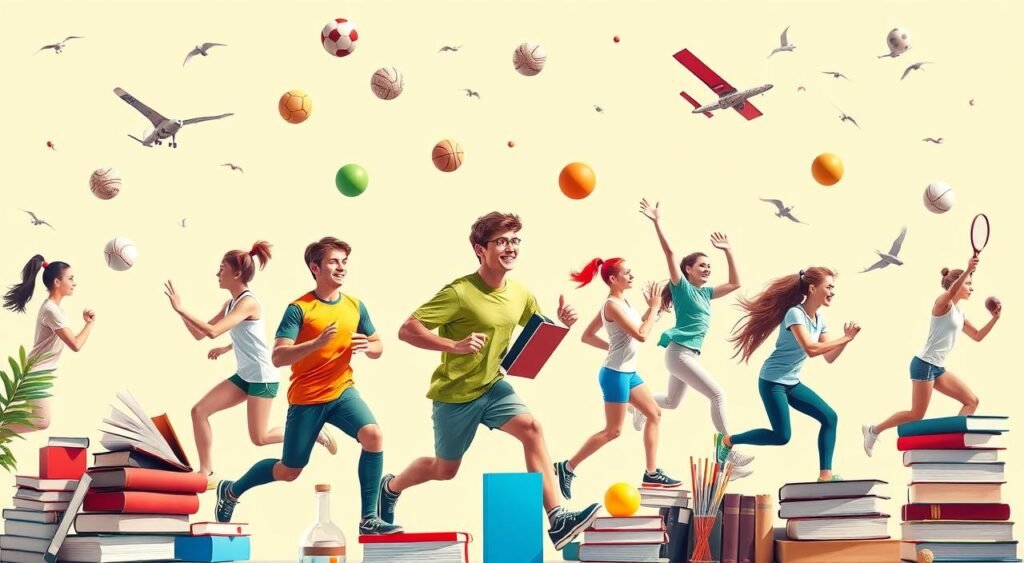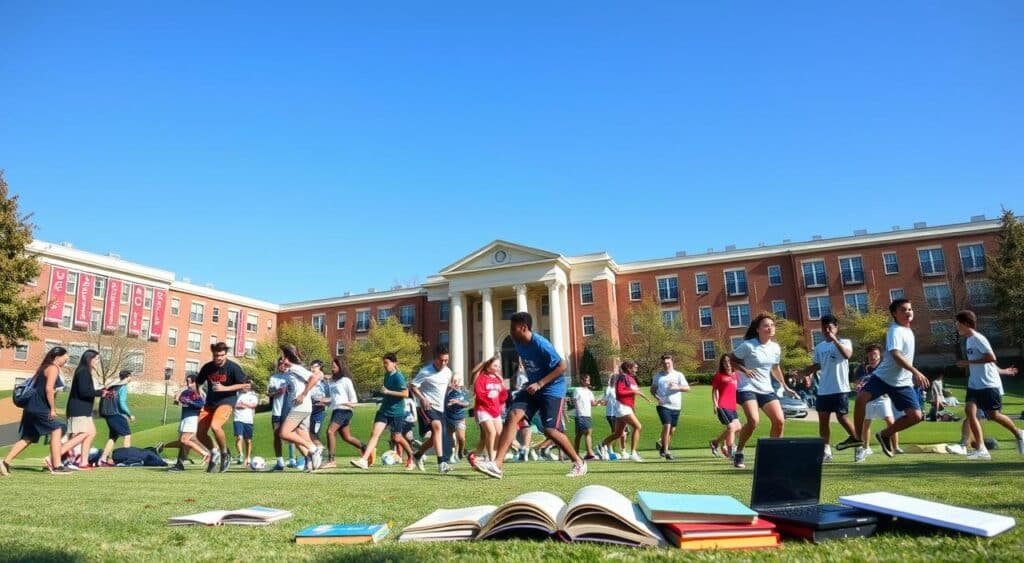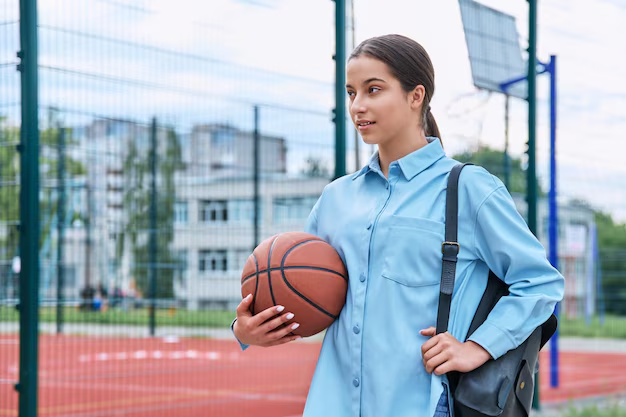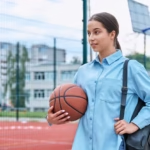University sports are key in shaping student-athletes’ academic success. Being active in sports boosts more than just physical health. It also improves mental sharpness, time management, and academic success. Universities offer many sports options, from NCAA programs to club and intramural leagues.
Sports have a big impact on students’ academic performance. They help with focus, teamwork, and overall health. Studies show that athletes often do better in school, manage stress better, and are more organized. These skills help them succeed in their studies.
Key Takeaways
- University sports provide numerous opportunities for student-athletes, including NCAA-level programs, club sports, and intramural leagues.
- Participation in sports enhances cognitive function, improves time management skills, and supports overall academic success.
- Student-athletes develop essential interpersonal skills, such as leadership, teamwork, and communication, which benefit their academic and professional lives.
- Physical activity and sports help reduce stress levels, leading to better focus and concentration on academic tasks.
- University resources, including tutoring, study sessions, and financial aid, support student-athletes’ academic performance.
Understanding the Role of University Sports in Academic Life
University sports are key in academic life, giving students many chances to stay active and grow. They offer everything from top NCAA varsity programs to fun intramural leagues. These activities help students balance their education, improving both their bodies and minds.
Athletic scholarships can really help students, easing financial worries and letting them focus on school and sports. Over 150,000 student-athletes get $2.4 billion in scholarships each year. This support is vital, as students often graduate with $35,200 in debt.
Also Read: What Is Aboriginal Art And What Techniques And Materials Are Used In Its Creation?
University sports make education more complete. Student-athletes get help with schoolwork, advisors, and access to great resources. They also get help with nutrition and training, improving their performance in all areas.
Being part of college sports also helps students grow personally and socially. They learn teamwork, join communities, and compete nationally and internationally. These experiences help them grow and stand out after graduation.
| Statistic | Value |
|---|---|
| Median lifetime earnings for bachelor’s degree recipients | 65% higher than high school graduates |
| First-generation Division I student-athletes | 15% |
| Annual NCAA resources provided to schools as part of the Academic Enhancement Fund | Undisclosed |
| Student-athletes who have returned to campus and completed their degrees since 2005 | More than 11,500 |
In conclusion, university sports are important in academic life. They offer financial, academic, and personal growth for student-athletes. From varsity programs to intramural leagues, they help students succeed in school and beyond.
Also Read: What Are The Key Steps To Ensure Insurance Compliance?
Physical and Mental Benefits for Student Athletes

Playing university sports has big benefits for student-athletes. They get better thinking skills, handle stress better, and feel overall well-being. These benefits help them do well in school and enjoy life more.
Enhanced Cognitive Function
Exercise boosts blood flow to the brain. This can make students focus better, remember more, and solve problems easier. Studies show that student-athletes often do better in school than others, thanks to the brain benefits from sports.
Also Read: How Can Universities Improve Their Student Housing Facilities?
Stress Management
University sports are great for managing stress. The endorphins from exercise lower anxiety and boost mood. Playing sports has been shown to reduce stress and improve mental health.
Overall Wellness Benefits
- Improved physical fitness and overall health
- Better sleep patterns and increased energy levels
- Enhanced self-esteem and confidence
Sports participation brings many wellness benefits. These benefits improve students’ lives, helping them succeed in school and grow personally.
“Engaging in university sports not only keeps me physically fit but also helps me manage stress and maintain a positive mindset. The mental and emotional benefits have been just as important as the physical ones in helping me thrive as a student-athlete.”
Also Read: How Can A Palette Generator Transform Your Artistic Process?
Time Management and Academic Organization

Being part of university sports helps student-athletes learn how to manage their time and stay organized. They balance sports with schoolwork, which helps them study better and prioritize tasks. This discipline helps them do well in school.
Studies show that good time management is key for student-athletes to succeed academically. High school athletes spend 10-15 hours a week on sports. College athletes spend 32 hours a week on sports during their season. Yet, they still manage to spend 40 hours a week on schoolwork.
Also Read: What Are The Benefits Of Choosing Online Car Insurance?
To do well in school, student-athletes need smart study strategies. Stanford University found that students who manage their time well can study 30% less and still get better grades. This shows how important it is for them to be organized and have good study habits.
- Division I student-athletes spend four to nine hours on their sport each day during competition.
- 67% of Division I student-athletes, 63% of Division II, and 47% of Division III spend as much or more time on sports in the off-season as during the season.
- 33% of Division I student-athletes’ time is on academics, and 85% is on time management. Division II and III athletes spend 31% and 28% on academics, respectively, and 84.5% on time management.
By learning to manage their time and stay organized, student-athletes not only do well in school. They also gain skills that will help them in life long after college.
Also Read: Dual Degree Programs: Boosting Your Career Potential
University Sports and Social Development
University sports are key in helping students grow socially. They teach students how to work together, leading to better leadership and teamwork skills. These skills are useful not just in school but also in the workplace.
Team Building Skills
Playing sports at university helps students achieve goals together. They learn to handle different personalities and make decisions as a team. These skills are important for working well with others in school and later in their careers.
Community Integration
University sports help students connect with their campus. By cheering for teams and joining in school spirit events and campus recreation, students feel part of a community. This sense of belonging makes college life richer and builds lasting friendships and professional connections.
FAQs
Q: How do university sports influence academic performance?
A: University sports can positively influence academic performance by promoting discipline, time management, and teamwork among student-athletes, which can translate to better study habits and academic success.
Q: Where can I find the official athletics website for the university?
A: You can find the official athletics website for your university by searching for it online or looking for quick links on the university’s main website.
Q: What type of content can I find on the university athletics website?
A: The university athletics website typically features schedules, results, news stories, photo galleries, and information about upcoming events related to university sports.
Q: Are there any upcoming events related to university sports?
A: Yes, you can check the events calendar on the athletics website for information on upcoming games, competitions, and special events.
Q: How can I stay updated on recent results from university sports events?
A: You can stay updated on recent results by visiting the athletics website, where results are typically posted shortly after the events conclude.
Q: What are the top stories featured on the university athletics website?
A: The top stories often include highlights from recent games, athlete spotlights, and news about teams and their performances during the season.
Q: Is there any way to watch university sports events online?
A: Many universities provide live streaming options for their sports events through their official athletics website or social media platforms, often including video content of games.
Q: What role does sports science play in enhancing university athletics?
A: Sports science plays a crucial role by providing research and data that can help improve training methods, injury prevention, and overall athletic performance, benefiting both athletes and teams.
Q: How can I find photo galleries from past university sports events?
A: Photo galleries from past events can typically be found under the media section of the athletics website, where you can browse through images from games and other athletic events.
Q: Are there any podcasts related to university sports?
A: Yes, many university athletics departments offer podcasts that feature discussions on recent events, athlete interviews, and insights into programs, which can often be accessed through the athletics website or popular podcast platforms.
Source Links
- https://www.bridgeport.edu/news/how-do-sports-help-students-academically/
- https://ysnlive.com/exploring-the-impact-of-sports-on-academic-excellence-in-students/
- https://www.ncaa.org/sports/2014/1/3/benefits-to-college-student-athletes.aspx
- https://www.bridgeport.edu/news/benefits-of-being-a-student-athlete/
- https://pmc.ncbi.nlm.nih.gov/articles/PMC10286465/
- https://post.edu/blog/student-athlete-mental-health/
- https://keystonesports.com/wellbeing-and-mental-health-in-student-athletes/
- https://untappedlearning.com/time-management-the-balancing-act/
- http://fs.ncaa.org/Docs/eligibility_center/Student_Resources/Time_Management_DI_DII_DIII.pdf
- https://www.northcentralcollege.edu/news/2021/09/15/how-manage-time-student-athlete
- https://www.edutopia.org/discussion/social-and-academic-benefits-team-sports
- https://socialwork.uky.edu/sport-social-work-research-lab-exploring-the-impact-of-recreation-on-youth-development/





